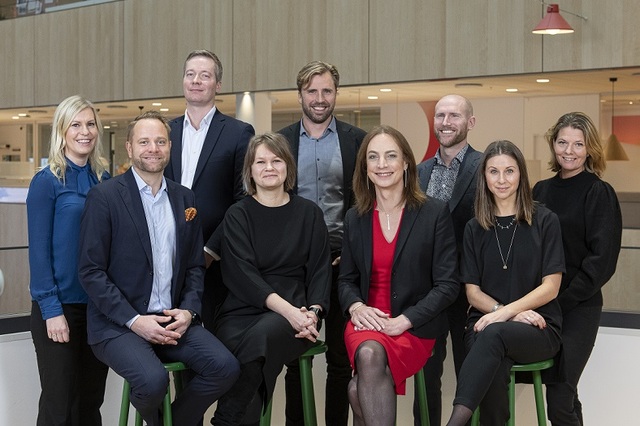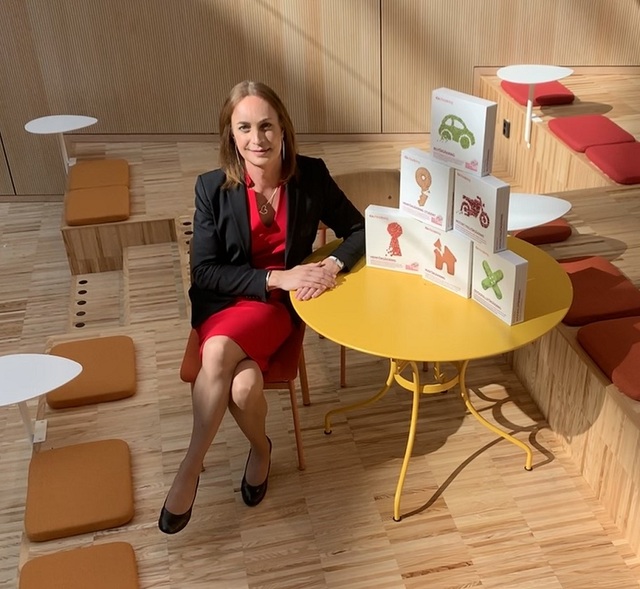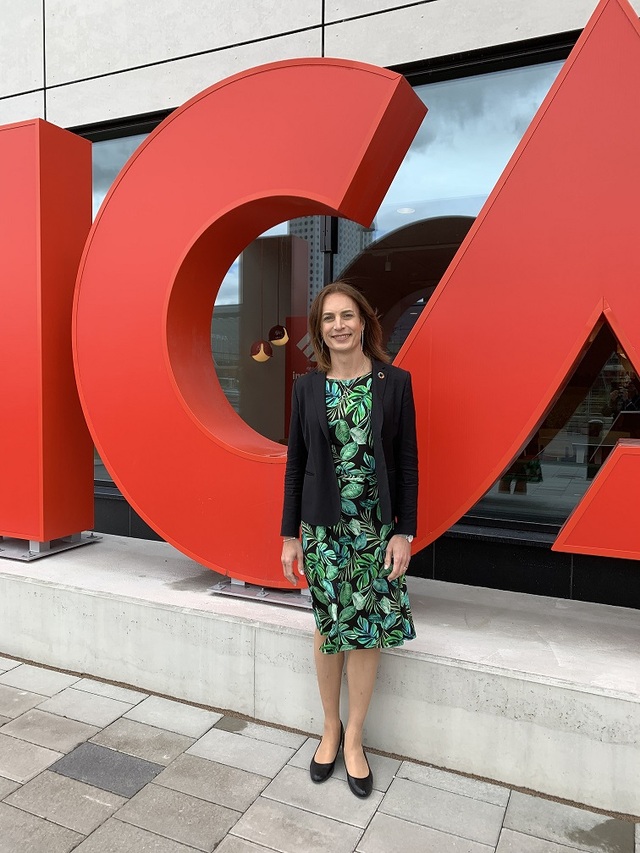The accomplished CEO discusses leading in crisis, the difference between diversity and inclusion, and the future of the consumer insurance industry.
Boyden’s Leadership Series presents discussions with business and thought leaders from organizations across the globe. The series focuses on topical issues that offer executives, political leaders and the media insight into current trends in business and talent management in the global marketplace.
This issue features Caroline Farberger, CEO of ICA Insurance, part of the Swedish ICA retailing group and the fastest-growing consumer insurer in the Swedish market, which started as a green-field operation five years ago. She discusses her recent journey as a transgender CEO, ICA Insurance as a disruptor among top Swedish competitors, how her global posts have shaped her perspective, the skills gap in the consumer sector, how culture affects hiring, and why inclusion is more important than diversity.
Prior to ICA Insurance, Farberger spent 16 years with Trygg-Hansa Insurance, the Swedish arm of British insurer RSA. She held a series of senior management positions with the firm across several business functions, including M&A activities, CEO of a subsidiary, and board memberships. Farberger was also a dot.com entrepreneur in the 2000s, leading the development of a VC-funded insurance start-up.
Farberger started her career as a management consultant with McKinsey, where she spent six years working mainly in the financial services area across the Nordics, the U.S. and several other countries. She holds dual degrees, in electrical engineering from Chalmers University of Technology and in business administration from Gothenburg University.
Farberger was named LGBTQ Person of the Year in Sweden in 2019 after having been the first CEO to publicly undergo a gender correction.
Boyden: We’re living in unprecedented times with COVID-19, and that is affecting companies, health and society. Over the years, how have you managed leading in crisis or critical situations?
Farberger: Yes, we are all very much living in unprecedented times. Rapid response is of the essence to establish control of the situation and assess potential impact on our staff, business, customers and suppliers. The safety and wellbeing of our staff and customers is always our first priority. Then we need to ensure the continuity of our critical business functions, which in our case starts with our claims handlers having the ability to quickly assist customers in need.
Depending on the nature of the crisis, the ability to make quick decisions in tough situations is critical to protect the financial interests of the company. Also important are frequent communication with staff and making sure management is available and empathetic to team members who need support. When the crisis is over, we want to have a business that is fit and prepared to take on new opportunities.
Boyden: How have your 25-plus years of experience in senior roles at Trygg-Hansa, Codan and McKinsey helped guide your vision for ICA Insurance?
Farberger: I have rotated across most of the senior positions available in the insurance industry, and over the last 25 years this has helped me develop deep knowledge in marketing, pricing and underwriting. These skills, along with what I learned when I started out as a management consultant, have helped me gain a broad perspective across different industry sectors. This experience has also shaped my fact-based business approach and has been fundamental in guiding me throughout my professional journey.

Boyden: How has your experience working in countries such as China, the U.S., Estonia and Germany influenced your management techniques and approach?
Farberger: It’s been quite interesting working in many different countries, especially as management practices do vary in each location. It’s easy to understand why Sweden is well-known for having a reasonably consensus-oriented decision-making culture – which, from an outsider’s point of view, can be viewed as loose or even ‘soft’ decision-making. On the other hand, working within that framework can be highly effective in making things happen without needing constant checkups.
That’s given me a lot to build on. I’m operating ICA with a very value-based, consensus-oriented structure. Importantly, having these broad cultural working experiences, I can choose from month to month, from year to year, the management style that is most appropriate for the situation my company is in.
Boyden: What was it about the ICA opportunity that attracted you?
Farberger: Working in the senior position within Trygg-Hansa, one of the big four incumbents in the Swedish market, was to some extent like being on the bridge of an oil tanker out on the ocean. You could make small changes to the rudder, and it would really take some time before you would see the bow of the ship actually make a turn.
For years, I’ve seen many small startups enter the industry, but very few of them have had any viable chances of breaking into the big four, until ICA entered the market. I saw a viable opportunity for this new entrant to break through the glass ceiling and seriously challenge the traditional big four industry structure. Therefore, the vision for ICA has been to redefine the market from ‘big four’ to ‘big five’.
This opportunity appealed to me greatly – to take an entrepreneurial journey, to build a company basically from scratch and apply all the lessons and mistakes I’d seen from 25 years in the industry, and seriously challenge the industry structure long-term. This role allowed me to create real change in the Swedish insurance market.

Boyden: Since its inception in 2015, ICA has become the fastest-growing consumer insurer in the Swedish market. What approach have you taken to help nurture this growth?
Farberger: The reason why other small entrants in the market have not been successful is that Swedish customers are very brand-loyal when it comes to insurance. They are not as price-aggressive, as in many other countries. They’re very brand-loyal. That means that unless you have a well-known brand, it’s very difficult to break through to any meaningful market share.
But ICA is different. ICA has an extremely well-known brand within grocery retailing, where over half the population does their groceries with us. Therefore, I saw that using the ICA brand, and labeling the insurance as ‘ICA Insurance’ is one important step to exploit. Having a customer base already is a huge competitive advantage.
ICA also has distribution channels, akin to digital platforms, with a huge, ongoing transactional flow of customer visits. So the approach is to harness those synergies: building on the brand, utilizing the existing customer base and channels, and then also building on the entrepreneurial culture that is the essence of the ICA culture.
Boyden: What has been your approach to hiring at ICA? Has it been similar to other companies?
Farberger: You need to really know insurance well, because insurance is a highly regulated industry, not only in Sweden but also everywhere. Since we’re a small organization, we’re dependent on relatively few skilled individuals, meaning that the insurance knowledge demanded by the members of the leadership team is high.
From a cultural point of view, it’s all about entrepreneurship. If you come from a big company, you’re accustomed to having all these processes in place that have been around for a decade, if not longer. But coming to a new company, you will inevitably be personally involved in writing and setting up the processes, which means you need to have an entrepreneurial mindset, practically a pioneering spirit to break new ground, do something right from the beginning. You need to go that extra mile and do some hard work yourself, and not rely on the previous generations of colleagues.
A can-do attitude and entrepreneurial spirit are really important. This includes finding new ways. At ICA Insurance, we will never be successful if we just copy what we were accustomed to doing with previous employers.

Boyden: What qualities do you feel are key to success in the consumer insurance industry, and where do you see a potential skills gap?
Farberger: It’s about data and digital solutions. Data is key. That’s always been the case in insurance. You need data to understand and correctly price risk. You also need data to understand customer behavior, and how to target customers through CRM. However, when I joined the industry 25 years ago, those skills were needed only among a few analysts. The management could get around with a very traditional approach.
In this new era, everyone in the organization needs to understand how to work with the data and how to use data to make fact-based decisions. We need to quickly pick up the pace in promoting an analytic culture.
Another area is on the front end of digitizing – the customer interface. We’ve had a history in the Swedish market of being very phone-based, which means that we’ve sold insurance policies over the phone, either inbound or outbound. But we’re quickly moving into a more digital environment, and that requires new skills.
Boyden: What consumer finance trends and changes in the insurance sector have you seen in Sweden and Europe more broadly over the last five years?
Farberger: Within the insurance industry there will be new intermediaries: new insurance techs entering the market, pushing the traditional insurers further back in the value chain, making the traditional insurance customer interface feel obsolete. This means transferences will increase. Consumers will be more educated by various types of robots or digital guides on how to more quickly and swiftly switch insurance providers.
The need for human touch will also diminish. Consumers will become more digitally savvy and expect more advanced digital solutions. A chat bot will probably replace traditional call center agents. This will all be a challenging environment for traditional insurers.
We’re talking a lot about data. Telematics and usage-based insurance are two important trends which will affect the insurance market, where players that are savvier than others to collecting and using customer behavior data for pricing will have a competitive advantage.
Boyden: How do you expect consumer finance trends to change over the next five-year period?
Farberger: Going forward, I see the rise of ecosystems. This means that future consumers, in five to 10 years' time, are less likely than today to wake up in the morning and find out, ‘I would like to buy an insurance policy’, and then contact an insurance provider. They are much more likely to expect that the insurance is included in a wider offering – which could be, if they buy a car, the insurance is included in the package. If they purchase an apartment, the insurance is already taken care of, in a larger package.
Future consumers are less likely to see insurance as a standalone purchasing decision. This means that we, as an insurance provider, need to decide where do we play in this field? Do we drive those ecosystems? Or do we become a supplier to those ecosystems, under someone else's lead?
Consumers will also have more power to compare offerings across companies. Transparency is key. Either we are transparent, or someone else will make us transparent.
Boyden: In 2019, you were named LGBTQ Person of the Year. How much of an impact do you feel recognition like this has in breaking conventional norms in the business world?
Farberger: It’s been a true icebreaker. The media coverage has been overwhelming, and 100% positive, not 99.9%, but 100% positive. I had no way of knowing how the Swedish business society would receive this. I came out in September 2018. I was on the front page of the leading business newspaper. I’ve received plenty of media attention, constantly, since then.
I know, from several people who have come forward to me, that it has made it easier for them to actually live their life as they are, even in the business world. Also, more importantly, it’s having hopes of reaching a senior role one day, even if they are non-normative. Since I am transsexual and a CEO, suddenly just being gay seems much less radical or controversial.

Boyden: There’s been much more work recently in promoting a diverse and inclusive environment. Where would you like to see more progress being made, and what is ICA doing to enhance this agenda?
Farberger: Here’s where the difference between diversity and inclusion comes into effect. Those two words are usually put together, but they are indeed different. It’s easy to target diversity as such. Meaning, essentially, that you make sure that you can provide good statistics in having employees on your roster. That’s the easy part.
The more difficult and more important parts are the inclusion piece. Inclusion means that you are able to harness the benefits of having a diverse workforce. This means letting people come to the table and then listening to them, letting them influence decisions, and not just employing them. That is more difficult, because it requires people longing for the norm, typically white, middle-aged males, to change their behaviors and start listening to others.
It’s all about inclusion. Diversity is already there, but inclusion is not typically understood.
Boyden: As a prominent LGBTQ CEO, what challenges did you feel you faced, and what lessons did you learn from going public?
Farberger: It was a life-changing journey for me. I had no idea what would happen, if I would be accepted or not. The more I approached my transition date, and especially after having informed my employer and they decided to be firmly supportive, the more I understood that it would probably be a success.
Then I came to the decision point of what to do about publicity. I knew that it would become public information either way, because I couldn’t get away with this in stealth mode, being a CEO. Then I decided ‘I want to own my story. I want to be the sender of my story’. Therefore, I liaised with the lead reporter of the leading business magazine in Sweden to ensure that a large article which I had approved appeared on day one of my transition – so when the story went out, it was my story. Not someone else getting it wrong, but my story.
Those are my suggestions to others: to not try to take one small step at one time, but rather make it a big bang. Make sure you own the story and go out broad and big. Because if you own your story, you’re much better off than people talking about you. You will end up chasing rumors.
Boyden: What advice would you give to others who face potential adversity or difficult or new situations across the globe?
Farberger: It’s not easy to give advice to others, but I am very humbled that Sweden is a progressive country. In fact, it’s the entire Nordics. My journey might have been more difficult in other countries. So maybe I am privileged in that way, despite the risk I believe I took. My general advice would be to take the plunge and live your life as who you are, because you have only one shot at living your life.
At the pivotal point, when I made my decision – should I transition and live life as who I am, with all the risks involved? Or should I continue the safe route of the white, middle-aged male, which is an easy way to get along in life? – I had a small thought: What if one of my children came to me and said, ‘Dad, I’m actually gay. Is that a problem?’ What should I tell my child? Should I tell my child ‘Think seriously if you want to live life like that, because you will have problems in life?’ Or should I tell my child ‘Of course, I’m fully supportive. You should live your life as who you are.’ Then I realized, if I’m to be a good example for my children, I need to live life as who I am, whatever the consequences. That made the decision easy for me.
We would like to thank Katarina Brixéus, Managing Partner at Boyden Sweden, for making this edition of Boyden’s Leadership Series possible.
The views and opinions expressed here do not necessarily represent the views of Boyden, only those of Ms. Farberger.




